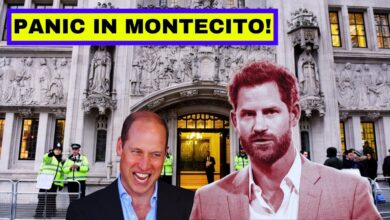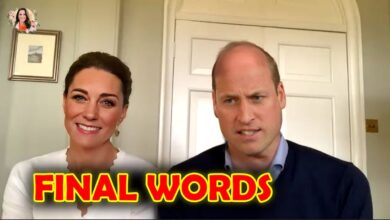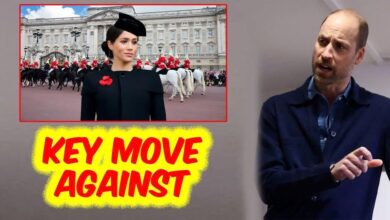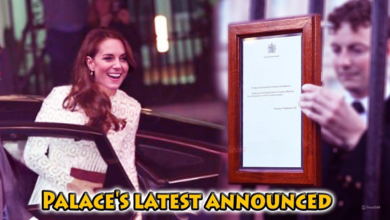King Charles Starts Crying As Prince William Makes SHOCKING DECISION For The Future Of The Monarchy
King Charles and tears as Prince William makes shocking decision for the future of the monarchy. The British royal family captivates people worldwide. From royal weddings to family feuds, they offer endless intrigue and drama. The latest twist—a shocking decision by Prince William—left King Charles in tears. This choice could reshape the monarchy, an institution that has lasted for centuries.
This article will explore the relationship between King Charles III and Prince William. We’ll look at the background, implications, and emotional weight of this decision. We’ll also discuss the monarchy’s history, its role in modern society, and what this revelation means for its future.
Chapter 1: The Burden of the Crown
The British monarchy is known for power, tradition, and duty. Kings and queens have ruled with authority and wisdom, often with a heavy heart. The crown’s weight has grown heavier in recent years. When King Charles took the throne after Queen Elizabeth II’s death, the nation looked to him to carry on her legacy.
Queen Elizabeth’s reign was marked by stability and duty, qualities that won her the public’s heart. But Charles faced different challenges, including personal scandal and family tensions. Many saw Charles as a transitional figure, a bridge between the old and new royalty. His life has been marked by personal scandal and public scrutiny, but nothing could have prepared him for Prince William’s decision, which shook the monarchy’s foundations.
The Emotional Weight of Leadership
For Charles, the crown’s burden goes beyond ceremonial duties. He has navigated a changing public image and a skeptical media throughout his life. Charles has been seen as emotional, sensitive, and aware of the expectations placed upon him. His relationship with Prince William has been the subject of speculation. While they have shared moments of warmth, tension exists. William, as the heir, has been groomed to follow his father but may now choose his own path, potentially changing the monarchy’s direction.
The Father-Son Dynamic
To understand William’s decision, we must look at the father-son dynamic between King Charles and Prince William. They are bound by blood and duty but have different personalities. Charles is traditional, valuing the monarchy’s historic role. William, seen as a modernizer, has embraced contemporary causes and connected the monarchy with the public. Their differences have led to tension, but nothing could have prepared Charles for William’s decision.
Chapter 2: The Decision That Shook the Monarchy
In an unprecedented move, Prince William made a decision that could redefine the British monarchy. The details were initially kept secret, but rumors swirled. The truth eventually emerged, revealing a choice that challenges centuries of royal tradition. Prince William told his dad he wants to change the monarchy’s role in Britain. He dreams of a simpler, more modern monarchy. William aims to cut down the pomp and circumstance that has been part of the royal tradition for so long.
The Core of William’s Vision
William wants the monarchy to be practical and relevant today. He believes a smaller, more focused royal family could win back public trust. This is crucial as more people question the monarchy’s role in modern society. He plans to reduce the number of royals working and focus on meaningful causes. William wants to concentrate on a few key charities rather than spreading themselves too thin. This approach could make the royal family more impactful.
But King Charles is heartbroken. He sees the monarchy’s grandeur and history as essential to its identity. Charles believes the royal family’s ceremonial role is vital to British society. He feels William’s decision is a betrayal of his life’s work.
The Public’s Reaction
People have mixed feelings about William’s plans. Some see it as a necessary change to keep the monarchy relevant. They believe a more streamlined approach could help the monarchy survive in a changing world. Others are upset, feeling the monarchy’s grandeur is what makes it special. They worry that cutting back on tradition will make the monarchy seem less majestic. They think the monarchy’s role is to inspire, not to be minimalist.
Charles’ Reaction: A Father’s Heartbreak
King Charles was deeply moved by William’s decision. He reportedly cried when told of the plans to change the monarchy. Charles had hoped William would follow in Queen Elizabeth’s footsteps, balancing tradition with modernization. Charles’ tears were not just about the monarchy’s future; they were also about his son’s decision to redefine his role. It was a moment of deep sadness for a father who had prepared his son for a life of duty.
Chapter 3: A Monarchy at a Crossroads
The monarchy is at a turning point with William’s decision. It has faced many challenges before, but this one feels different. The question is, will this be a time of revival or decline for the royal family?
The Historical Context
The monarchy has weathered many storms over the centuries. It has adapted and survived, balancing tradition and progress. But lately, the monarchy has struggled to connect with the modern world. The rise of social media has brought more scrutiny. Public opinion is more divided than ever. Some see the monarchy as a cherished symbol, while others view it as outdated and unnecessary.
William’s decision to slim down the monarchy is a response to these changes. He believes the monarchy must evolve to survive, but this evolution comes with challenges, and not everyone is ready to accept it.
The Impact on the Royal Family
William’s decision has sparked debate within the royal family. Some, like Prince Harry, support a modern approach. Others, like Princess Anne, are more cautious. King Charles is uneasy about the decision. He values tradition and finds the idea of reducing the monarchy’s grandeur hard to accept, yet he understands William’s desire to protect the institution for the future.
Chapter 4: The Future of the British Monarchy
The British monarchy is entering a new chapter, marked by change and uncertainty.
A Leaner, More Focused Monarchy
William’s vision for a leaner monarchy could be its survival key. By aligning with modern Britain’s values, he aims to keep the monarchy relevant. A more accessible, transparent monarchy could win over younger generations. The shift to fewer working royals could reduce scandals, as only those closely related to the throne will have duties. William hopes this will make the monarchy more impactful and engaging for the public.
Adapting to Public Expectations
The monarchy must navigate public expectations in today’s world. Prince William’s decision reflects his understanding of this. He believes the royal family should be more connected and transparent. This vision matches the British public’s changing attitudes. There’s growing discontent with royal life’s perceived excesses. William’s plan to scale back ceremonial aspects could address these concerns.
Yet, modernizing the monarchy comes with risks. Losing its mystique is a concern. The monarchy’s grandeur and tradition have captivated the public for centuries. Stripping these away could make it seem less important.
The Role of the Media
In today’s media landscape, every royal move is scrutinized. Prince William’s decision has sparked a media frenzy. The monarchy-media relationship is complex, and this development adds to it. The media can shape public perception. If William’s plans are seen as modernizing, they might be welcomed, but negative media coverage could harm the monarchy’s image.
King Charles’ emotional reaction has become tabloid fodder. The monarchy’s image is at risk in today’s media, where even the best PR strategy can fail with one headline or tweet. The royal family must manage its media relationship carefully. How they communicate this decision will be crucial in strengthening or weakening the monarchy.
The Queen’s Legacy and William’s Burden
At the heart of this drama is Queen Elizabeth II’s legacy. She balanced tradition and change with grace. Her grandson William aims to honor her legacy while forging new paths. William faces a huge challenge: he must compare to his grandmother’s reign. The British public and the world will watch to see if he meets expectations.
Chapter 5: The Potential Consequences
William’s move to modernize the monarchy could secure its future, but it also brings risks. The effects of such a big change could last for years, and not all will be good.
Internal Family Tensions
William’s decision has put a strain on the royal family. King Charles’ emotional response is just the start. Other family members, like Princess Anne, might feel left out. These tensions could lead to more family divisions, reminding us of Prince Harry and Meghan Markle’s departure. William’s goal is to protect the monarchy, but it could cause more drama.
The Public’s Response
The public’s opinion is key to the monarchy’s future. Younger people might like a modern monarchy, but older ones may not. The monarchy’s survival depends on the British people’s support. This decision could also affect British politics. The monarchy’s role is ceremonial but still powerful. If seen as weakened, it could boost the Republican movement in the UK.





:max_bytes(150000):strip_icc():focal(431x0:433x2)/prince-william-1-fcc21ec8ac9346be85394b98c82b3877.jpg)







